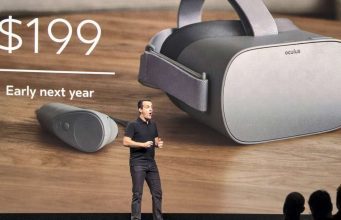
Hugo Barra, Meta’s former Head of VR, offered some unique insight into the XR industry recently with an extensive blogpost that centers around Apple Vision Pro. Barra warns that, like the company’s first standalone headset Oculus Go, the novelty around casual content consumption will probably fade fairly quickly.
Looking back at his time at Meta (then Facebook), Barra notes that Oculus Go was “the biggest product failure” he’d ever been attached to, stating that although casual content consumption was the headset’s raison d’être, the hype wore off pretty quickly.
Here’s Barra’s appraisal of the situation:
Watching TV/movies in virtual reality seemed like such an incredibly compelling idea that we (the Oculus team at Meta/Facebook) built an entire product around that idea — Oculus Go.
Launched in 2018, Oculus Go was the biggest product failure I’ve ever been associated with for the simple reason that it had extremely low retention despite strong partnerships with Netflix and YouTube.
Most users who bought Oculus Go completely abandoned the headset after a few weeks. The full story is much more nuanced (including the fact that the Oculus Go failure got us on the path to Oculus Quest very quickly), but it taught us an important lesson.

Barra notes that poor retention for Oculus Go had to do with a few common factors, including user comfort, friction in starting a session when not already wearing the headset, and the social isolation of watching content alone—all of which is true for Vision Pro as well.
Barra concludes that, at least as far as Oculus Go went, traditional media consumption was “not a core ‘daily driver’ pillar but more an ancillary use case that adds some value to other core pillars (such as productivity or gaming).”
Granted Barra says Vision Pro brings more to the table thanks to its better displays than previous VR headsets, which can create “magical movie experiences on occasion,” but those same challenges that Oculus Go contended with basically remain.
Barra initially moved to Meta (then Facebook) in 2017 from his role as Global VP at the China-based tech giant Xiaomi, becoming head of Oculus and VP of Reality Labs partnerships. Leveraging his experience at Xiaomi, Meta even tapped the Chinese tech giant to manufacture Oculus Go for both the international market and the Chinese domestic market, also branding it under the name ‘Mi VR Standalone’, belying just how big the company expected Go to resonate.
Only a short year after the release of Oculus Go though, the company shifted gears to launch its first room-scale-capable standalone Oculus Quest, nearly abandoning Oculus Go entirely, which in addition to largely relying on Samsung Gear VR apps, omitted motion controllers due to only being tracked in three degrees of freedom.
Then again, that’s where the comparions stop, as Vision Pro has great hand-tracking, millions of apps, and compelling mixed reality passthrough—all of the things Barra says Apple is hoping to use to make Vision Pro “the future of work.”
The post Meta’s Former Head of VR: Oculus Go Was His “biggest product failure” & Why it Matters for Vision Pro appeared first on Road to VR.